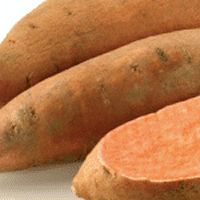Yam

  | Yam in TCM:Explore the properties of Yam according to Chinese
Nutrition and Traditional Chinese Medicine (TCM):
Temperature: neutral
Channels: LU, SP, KD
Flavors: sweet
Tonifies: qi, yin
In terms of Traditional Chinese Medicine (TCM) Yam is known for its ability to tonify qi and yin.
In general the ancient Chinese medical texts cite that it enters the lung, spleen, and kidney. Furthermore Yam is considered to be neutral in temperature. The flavor is sweet.
While some sources classify sweet potato differently than yam, other sources tend to lump them together. However, sweet potatoes and yams are indeed different species with distinct botanical characteristics. Sweet Potato (Ipomoea batatas) is in the family Convolvulaceae (morning glory family) and originates from Central and South America. Sweet potatoes have a smooth, thin skin that can be orange, purple, or white, with flesh that is usually sweet and moist. They are typically tapered at both ends, high in beta-carotene, vitamin C, and fiber. Yams come from the family Dioscoreaceae and originate from Africa and Asia. They have a rough, scaly, and thick skin with dry flesh that ranges from white to purple to reddish hues. They can grow much larger than sweet potatoes, sometimes reaching up to several feet in length. Yams are starchier and drier than sweet potatoes and contain a different set of nutrients. Yams are rich in vitamin C and potassium.
In the U.S., "yam" is often used to label orange-fleshed sweet potatoes, especially in grocery stores. However, true yams are typically only available in international or specialty markets and have quite a different taste and texture from sweet potatoes.
From the perspective of Chinese nutrition, yams and sweet potatoes enter different channels but have fairly similar properties. They are believed to strengthen the spleen-pancreas and increase the quantity of milk in lactating women. Sweet potato is very rich in vitamin A and helpful for night blindness especially when combined with spirulina, or in severe cases organic animal liver[1].
For jaundice cook yam soup with squash and pearled barley. For eczema of the body or genital area take a tea with sweet potato and pinch of salt and apply to the local area. Afterwards sprinkle natural talcum powder on the area. For poisonous insect bites mash yam or sweet potato with honey and apply locally. For cirrhosis of the liver with edema in the abdomen, apply a mix of sweet potato and brown sugar to the navel and change hourly. For bloody stools mix sweet potato powder or yam powder with honey. [22]
Caution: eating too much sweet potato can cause indigestion and abdominal swelling. The red flesh varieties are especially sweet and may cause weakness if overeaten [1].
Disclaimer: In accordance with our terms of service, by using this web site you agree that none of the information found on this web site constitutes medical advice. You should always consult your doctor before trying any particular food or herbal remedy to treat disease.
Folk remedies presented on this site are designed to address specifc TCM diagnoses, and are not one-size-fits-all. If you would like to learn more about Traditional Chinese Medicine (TCM) and how it relates to Chinese Nutrition, you can book in a free call with a licensed professional. There is no obligation to purchase.
[CLICK HERE for your free INITIAL CONSULTATION] |

